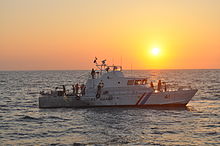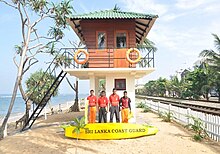Sri Lanka Coast Guard
This article includes a list of general references, but it lacks sufficient corresponding inline citations. (May 2016) |
| Sri Lankan Coast Guard | |
|---|---|
 Sri Lanka Coast Guard crest | |
| Active | 2010–Present |
| Country | Sri Lanka |
| Type | Coast Guard |
| Part of | Ministry of Defence |
| Rear Headquarters | Wellawatta |
| Motto(s) | Serene Sea |
| Anniversaries | Coast Guard Day: 4 March |
| Website | www.coastguard.gov.lk |
| Commanders | |
| Director General | Rear Admiral Samantha Wimalathunga RWP, USP, MSc(DS)Mgt, MA(SSS) |
| Deputy Director General | Commodore DSAAP Samarasinghe RWP, RSP, USP, psc |
| Insignia | |
| Ensign |  |
The Sri Lankan Coast Guard, officially the Department of Coast Guard, is a Sri Lankan non-ministerial government department tasked with Coast guard duties within the territorial waters of Sri Lanka. It comes under the purview of the Ministry of Defence and is staffed by civilian personnel.[1] It is headed by Director General of Sri Lanka Coast Guard, currently Rear Admiral Samantha Wimalathunga.
President Mahinda Rajapaksa, as the Minister of Public Security, Law and Order, presented a cabinet paper with regard to the establishment of the Department of Sri Lanka Coast Guard. The Cabinet of Ministers approved the cabinet paper, paving the way to establishing the Sri Lanka Coast Guard on 7 March 2007.
Coast Guard Act, No. 41 of 2009 was enacted by the Parliament on 9 July 2009 to incorporate the Department of Coast Guard. The Coast Guard was inaugurated on 4 March 2010.
Sri Lanka Coast Guard functions under the Ministry of Defence. It is a non-military law enforcement agency at sea. Every Coast Guard officer of the Department of Coast Guard is deemed to be a peace officer for the purposes of the Code of Criminal Procedure Act, No. 15 of 1979. It has legal authority to search and arrest ships, craft and personnel engaged in illegal activities in maritime zones and the territorial waters of Sri Lanka, and to institute legal proceedings against offenders
Vision statement
"Peaceful maritime environment whilst protecting national interests"
Mission statement
"Ensure the security and serenity of the maritime environment whilst enforcing the law at sea. The Coast Guard is further committed towards the sustainable management and development of marine resources."
Responsibilities and functions
- Law enforcement, in the coastal areas, the territorial waters, and the maritime zones of Sri Lanka, and high seas.
- Prevention of illegal fishing in the coastal areas of Sri Lanka and the protection of the fishermen including rendering assistance at sea.
- Providing assistance to the Customs and other relevant authorities in counter smuggling operations and border management.
- Prevention of illegal human trafficking.
- Prevention of piracy.
- Cooperating with the law enforcement agencies and armed forces by taking necessary measures for the suppression of destructive terrorist activities occurring in the maritime zones and the territorial waters of Sri Lanka.
- Prevention of trans-boundary movement of narcotics by sea.
- Rendering of necessary assistance to the relevant authorities in ensuring safety of life and property at sea.
- Participating in search and rescue operations in times of natural catastrophes and providing assistance in salvage operations in relation to vessels and other goods after such incidents and other accidents at sea.
- Rendering of necessary assistance in the preservation and protection of maritime and marine environment.
- Rendering of necessary assistance to the relevant authorities in the implementation and monitoring of measures required for the prevention and control of marine pollution and other disasters which occur at sea.
- Rendering assistance in the conservation of marine species.
- Dissemination of information including warnings by radio or any other means in time of natural catastrophes.
- Providing security to maritime transportation and rending assistance to ensure navigational safety.
- Performance of such other functions as may from time to time be conferred on or assigned to by the government.



History
1999 75 personnel were recruited to SLCG as Officers, Sergeants and Mariners and construction of vessels for SLCG commenced at Neil Marine and Ceynor Boat yards.
2000 Lt Cdr CR Bulegoda Arachchi, a retired Naval Officer, was appointed as the Head of SL Coast Guard by a cabinet paper approved by the Cabinet of Ministers on 1st Aug 2000.
2001 Coast Guard Acts of Asian region were brought and the drafted SLCG act was submitted to the Department of Legal Draftsman. Basic training of CG personnel commenced by SL Navy at SLNS Gemunu, Welisara. Professional training commenced at the Japanese Coast Guard Training Center in Tokyo, Japan. 06 vessels constructed and launching of vessels took place at the Fishery harbour, Beruwala presided by the Minister of Fisheries and Aquatic Resources, Mahinda Rajapaksa. CG Vessel Mahiraja - Search and Rescue operations. CGV Ruhunu and CGV Maya - Fisheries protection in coastal areas. CG Vessels Kadira, Giruvaya and Maagama - Harbour duties.
2002 Incumbent Government in the year 2002 decided to abolish the functioning of SLCG on 31 March 2002 and all assets and personnel were transferred to Coast Conservation Department.
2009 The President Mahinda Rajapaksa being the Minister of Defence presented a cabinet paper with regards to the establishment of Department of Sri Lanka Coast Guard Coast Guard Act. No 41 of 2009 was enacted by the parliament on 9 July 2009, and formed the present Sri Lanka Coast Guard.
Powers of the Department of Sri Lanka Coast Guard
- Stop, enter, board, inspect and search any place, structure,vessel or aircraft and arrest and detain any vessel or aircraft.
- Demand the production of any license, permit, record, certificate or any other document and inspect such license, permit, record, *certificate or other document or make copies of or take extracts from such licenses, permit, record, certificate or other document.
- Investigate any offence which it has reason to believe is being committed or is about to be committed or has been committed.
- Exercise the right of hot pursuit.
Rank structure
| Commissioned Officer grade structure of the Sri Lanka Coast Guard | ||||||||||
|---|---|---|---|---|---|---|---|---|---|---|
| Rear Admiral
(RADM) |
Commodore (CMDE) |
Captain
(CAPT) |
Commander
(CDR) |
Lieutenant Commander (LCDR) |
Lieutenant
(LT) |
Sub Lieutenant (SLT) | ||||
| O-7 | O-6 | O-5 | O-4 | O-3 | O-2 | O-1 | ||||
 |
 |
 |
 |
 |
 |
 | ||||
| Rate structure of the Sri Lanka Coast Guard | ||||||||||
|---|---|---|---|---|---|---|---|---|---|---|
| MASTER CHIEF PETTY OFFICER
(MCPO) |
SENIOR CHIEF PETTY OFFICER (FCPO) |
CHIEF PETTY OFFICER
(CPO) |
PETTY OFFICER
(PO) |
LEADING RATE
(Lsea) |
ABLE RATE
(AB) |
ORDINARY RATE (OD) | ||||
| O-7 | O-6 | O-5 | O-4 | O-3 | O-2 | O-1 | ||||
 |
 |
 |
 |
 |
 |
 | ||||
Deployment
Sri Lanka Coast Guard plans to establish Shore Bases island wide and to enhance the fleet unit strength to perform activities in connection with their functions effectively. Shore Bases of Sri Lanka Coast Guard have been already established in Colombo, Mirissa, Dikovita,Wellawatta, Dehiwala, Mount Lavinia, Panadura, Beruwala, Aluthgama, Balapitiya, Ambalangoda, Kirinda and Kankasanturai. Plans are underway to establish more shore bases at Kalpitiya, Mannar, Oluvil and Hambanthota in the near future.
Sri Lanka Coast Guard Life-Saving Activities
Saving lives remain as one of the most important task of any Coast Guard in the world. In keeping with the same standards, the Sri Lanka Coast Guard (SLCG) commenced its life-saving activities in year 2009. Since winning the war, the tourism industry gradually developed and the number of tourists visiting the country increased rapidly.
Out of many tourist attractions in the country, our world=famous beautiful beaches remain as one of the most important tourist destinations in the country. Apart from foreign tourists being attracted to beaches around the country, a large number of local tourists too have been visiting the beaches around the country especially after year 2009.
While enjoying the beaches and a swim in our glamorous seas, we as the SLCG have a huge obligation as well as a responsibility to protect those who step into our beaches and seas. Keeping this very fact in mind and abiding by the SLCG ‘life-saving’ motto ‘We Save Lives”, CG is looking forward with a clear vision of making our sea safer to all. With the rapid developments that are taking place in the ‘life-saving’ field, the SLCG aim at providing the best ‘life-saving’ assistance to the public in the future.
Life-Saving Posts


After identifying the importance of positioning SLCG life-savers at key tourist attracted beach areas in the country, professional life-savers were positioned at following locations;
- Galle Face.
- Wellawatta.
- Mt. Lavinia.
- Panadura.
- Aluthgama
- Balapitiya.
- Mirissa.
- Polhena-Matara.
- Kirinda
- Nilaweli (2 Points).
- Dehiwala
Local and foreign tourists who are visiting these beaches have commended the excellent work of CG life-savers. With a total of over 70 professional and qualified life-savers in the SLCG, a large number of lives have been saved during the short time span. SLCG have introduced a low cost model ‘life-saving’ post at Wellawatta beach area.
This life-saving post has been a major attraction in the Wellawatta beach area. SLCG expects to establish all of its life-saving posts similar to Wellawatta post in other earmarked beach areas too.
Life-Saving Training
The SLCG is in possession of 70 qualified life-savers. Among these qualified life-savers, the Chief Examiner of the Life-Saving Association of Sri Lanka have added strength in providing professional and expertise ‘life-saving’ training for CG personnel as well as to the public.
The CG life-savers are qualified in following major categories
- Bronze medal.
- Intermediate.
- Resuscitation.
- Basic
With the recent establishment of a dedicated CG ‘life saving’ training center at Balapitiya recently, CG ‘life-saving’ training has expanded not only to the CG personnel but also to the outsiders too. Cadets of the National Cadet Corps followed the initial ‘life-saving’ programme conducted at this training center and a dedicated training programme conducted for the youth in Balapitiya area. This will have a direct impact on the tourism industry in the area and these youths will be recognized as professional life-savers.
Apart from training being conducted at this center, SLCG base at Mirissa too conduct professional training for CG personnel.
Sri Lanka Coast Guard Turtle Conservation Project (CGTCP)
The Coast Guard Turtle Conservation Project (CGTCP) was launched in September 2012 with the purpose of preserving and raising the awareness of sea turtle conservation in Sri Lanka. Further, Coast Guard action plan include providing scientific data related to turtle behaviour (Nesting, hatchlings, feeding, mating) to those who are conducting researches onthese endangered species. The CGTCP is located at Mirissa beach (adjoining Coast Guard Station Rohana) which is considered as one of the most suitable location suitable for turtle nesting.[2]

The Coast Guard initiative to protect these endangered species have been praised by many local and foreign visitors who have seen the effort the Coast Guard personnel have put in to this project.
References
- ^ Coastguard to get sweeping powers
- ^ "Sri Lanka Coast Guard - TURTLE CONSERVATION BY SRI LANKA COAST GUARD". www.coastguard.gov.lk. Retrieved 12 May 2016.
